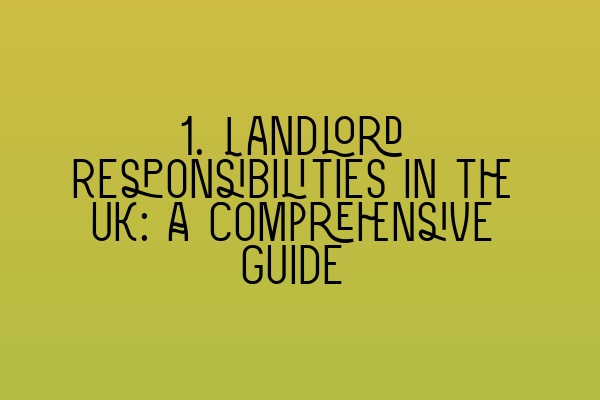Landlord Responsibilities in the UK: A Comprehensive Guide
Welcome to SQE Property Law & Land Law. As solicitors specializing in property law, we understand the importance of landlord responsibilities in the UK. Whether you are a new landlord or have been in the business for years, it is crucial to have a comprehensive understanding of your legal obligations. In this guide, we will provide you with an overview of the key responsibilities you need to be aware of.
1. Rent and Tenancy Agreements
When it comes to renting a property, one of the primary responsibilities of a landlord is to collect rent from the tenants. This involves setting the rent amount in accordance with current market rates and ensuring that it remains reasonable throughout the tenancy period. Additionally, it is essential to have a written tenancy agreement in place that outlines the terms and conditions of the tenancy. This agreement should address key aspects such as the duration of the tenancy, the rent payment schedule, and any additional responsibilities of the tenant.
For more information on tenancy agreements, you may find our related article on SQE 1 Practice Mocks FLK1 FLK2 useful.
2. Property Maintenance
Landlords are responsible for ensuring that the rental property is maintained in a safe and habitable condition. This includes conducting regular inspections to identify any maintenance or repair needs and addressing them promptly. It is crucial to keep the property in good repair, including maintaining the structural integrity, electrical systems, plumbing, and heating facilities.
For more detailed guidance on property maintenance, you may refer to our related article on SQE 1 Preparation Courses.
3. Safety and Security
Ensuring the safety and security of tenants is another important responsibility of landlords in the UK. This includes providing adequate fire safety measures such as smoke alarms, fire extinguishers, and fire escape routes. It is also essential to conduct regular gas and electrical safety inspections by qualified professionals.
For more information on safety regulations, you can visit our related article on SRA SQE Exam Dates.
4. Repairs and Maintenance
Landlords have a legal duty to promptly address repairs and maintenance issues reported by tenants. This can include fixing plumbing or electrical problems, repairing structural damage, or addressing issues with appliances provided with the rental property. Failing to address these issues in a timely manner can result in legal consequences and impact tenant satisfaction.
5. Deposit Protection
Landlords in the UK are required to protect their tenants’ deposits using a government-approved tenancy deposit protection scheme. This scheme ensures that the deposit is held securely and provides mechanisms for dispute resolution at the end of the tenancy. Failure to protect the deposit can result in legal penalties.
For more comprehensive information on deposit protection, you may find our related article on SQE 2 Preparation Courses helpful.
Conclusion
Understanding and fulfilling your landlord responsibilities is crucial to maintaining a successful and legally compliant rental business in the UK. By following this guide and staying informed about the latest regulations, you can ensure a positive landlord-tenant relationship and protect your investment.
If you are preparing for the SQE exams, you may find our related articles on SQE 1 Practice Exam Questions helpful.
